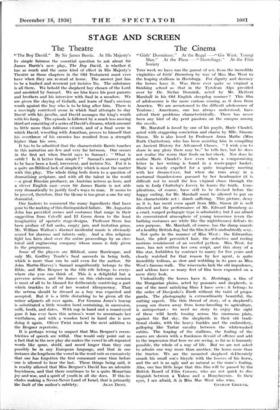STAGE AND SCREEN The Theatre
"The Boy David." By Sir James Barrie. At His Majesty's
IN simple fairness the essential question to ask about Sir James Barrie's new play, The Boy David, is whether it has as much and the same kind of effect in His Majesty's Theatre as those chapters in the Old Testament must ever have when they are re-read at home. The answer just has to be a hushed and reverent yet incisive No. The substance is all there. We behold the shepherd boy chosen of the Lord and anointed by Samuel. We see him leave his poor parents and brothers and his interview with Saul in a meadow. We are given the slaying of Goliath, and learn of Saul's envious wrath against the boy who is to be king after him. There is a movingly contrived scene in which Saul attempts to slay David with his javelin, and David assuages the king's wrath with his hart). The episode is followed by a much less moving third act consisting of a series of David's dreams, which amount to little more than tableaux vicants, and of a final scene in which David, wrestling with Jonathan, proves to himself that his overthrow of his enemies has resulted from a strength higher than his own.
It has to be admitted that the characteristic Barrie touches in this'narration are few and very far between. One occurs in the first act when David says to Samuel : "What is nibtle IS it better than simple?" Samuel's answer ought to be have been a loud, irreverent, and incisive No. For it is a quite tm--Biblical lack of simplicity which is most the matter with this play. The whole thing boils down to a question of dramittliAng: scripture, and with all the talent in the world —a great Russiaii producer, an Austrian actress as hero, and a clei-er Pinglish cast—even Sir James Barrie is not able very dramatically to justify God's ways to man. It seems to be proved, therefore, that the theme is too great a one for any d raina t 1st One hastens to conunend the many ingredients that have gone to the making of this distinguished failure. Mr. Augustus John has piovided scenes and costumes that range in their suggestion from Crivelli and El Greco down to the least imagitiatii•e Of operatic' stage-designs. Professor Stern has been pi.ohise of full sacks, empty jars, and imitation grass. Mr. Williarn Walton 's discreet incidental music is obviously scored for Shawnis and tabrets only And a dim religious VOA-has ben shed over the entire proceedings by an elec- trical itheengineering company whose name is duly given in the ..programme. Sonic of the players arc Biblical, some Barriesque, and only Mr. Godfrey Tearle's Saul succeeds in being both, which i4 more than can be said even for the author. Sir John Martin-Harvey's Samuel magnificently belongs to the Bible, and Miss Bergner in the title role belongs to every- where else you can think of. This is a delightful but a perverse actress, and Sir James on this elaborate occasion is most of all to be blamed for deliberately contriving a part which trucldes to all of her wonted idiosyncrasy. That the actress should be dressed as a boy was expected and accepted. But it is a little disturbing to be given all the minor adjuncts all over again. For Gemrna Jones's teacup is substituted a little wooden bowl containing, in suct*gsion, milk, broth, and dates. With cup in hand and a round-eyed gaze it has ever been this actress's wont to accentuate her wistfulness, and with a wooden bowl. in hand she is now doing it again. Oliver Twist must be the next addition to the Bergner repertoire.
It is perhaps wrong to suspect that Miss Bergner's eccen- tricities of speech are wilful. One would only point out as a fact that in the new play she makes the vowel in oft-repeated words like spear, shield,' and sword longer than they can possibly. be in any European language, and that in one instance She lengthens the Vowel in the word rain so excessively that one has forgotten the first consonant some time before • one is allowed to hear the last. These. things being said, it is readily allowed that Miss Bergner's David -has an adorable boyishness, and that there continues to he a quite Mozartian joy and- woe, and a spirit 'ofyouth in all she does. If this in- cludes making a Never-Never Land of Israel, that is primarily
the fault of the author's subtlety. ALAN Dra:rr.










































 Previous page
Previous page